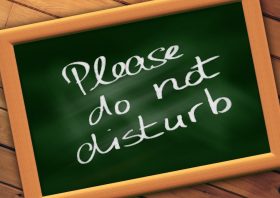Welcome to this guest post by Anne McGhee Stinson
Distractions – the impact on our performance
Minimising distractions at work is a key priority at work for those who want to improve their performance and well-being. Why is minimising distractions more important than ever before?

Distractions, Distractions
In a recent Harvard Business Review Article entitled Learning to live with Complexity the author states: “….[B]usiness today is fundamentally different than it was just 30 years ago. The most profound difference, we’ve come to believe, is the level of complexity people have to cope with.” This rising level of complexity is spawned by new technologies, a global landscape, and more collaborative work environments. Virtually everything about the way we work is changing creating massive distractions in the workplace.
While the complexity continues to increase we haven’t reckoned with the impact it has on our capacity to focus. Neurologically, our central nervous system is hard-wired to pay attention to the most distracting element in the environment. This response system is what kept us safe as a species of hunter gatherers, because the rustle in the bush may well have been a hungry lion.
Unlike today; our distant ancestors had the benefit of a period of recovery after surviving the lurking lion. They went back to the cave, ate, slept, and recovered in peace. There was no 24-hour news coverage, and none of the incessant demands of the modern workplace including back to back meetings, hundreds of emails, projects, teams, travel schedules etc.
External distractions are only part of the problem. In an overloaded society; the internal distractions caused by too much input, financial worries, relationships and family pressures take their own toll. Human beings have a limited amount of attention and energy to spend at any given time and because we are so inundated with complexity, information and data, our days are constantly filled with lurking lions causing our attention to be exhausted.
From a professional perspective, this can translate into an inability to access innovation, creativity, intelligent risk-taking, decision-making and our full performance potential. It can also mean we are missing opportunities for strategic connections, deepening relationships, mentoring, coaching, guiding and so forth. From a strictly personal vantage point, people are experiencing more stress, anxiety, isolation, and fear than ever.
Distractions – how to minimise them
Organizations must address these challenges with a new approach and train the skills most essential to success in complex, distraction laden work environments.
Initially, we must learn how to manage attention and energy at work, learn to reduce distractions, manage time and information input. These are the critical skills that will help employees stay productive in an ever-changing work environment. Some simple adjustments include:

Stay focused
1. Turn off all the bells, chimes and notifications on your phone and computer. Instead schedule focused time to process incoming information.
2. Schedule routine 1:1 meetings with team and staff to reduce ad hoc interruptions during the day.
3. Work from home or a remote location where you are less likely to be distracted by open office environments.
4. Establish communication guidelines to set reasonable response time expectations.
Next, we must learn how to maintain focus on the priorities that matter most. Author Daniel Pink noted in his book “Drive” that an interesting change occurs in our brain when we commit to such a goal. He states; “Once we consciously focus on a goal, the brain subconsciously evaluates goal-relevant information in our environment that is consistent with achieving the goal. Like radar, it selectively notices incoming data that may contribute to or influence the goal. Concurrently, the brain inhibits irrelevant information to protect our delicate cognitive capacities from overload.”
5. Identify your priorities are, and create an emotional attachment to them to keep you focused.
6. Rigorously manage your calendar to make certain you’re are spending your time on what matters most.
7. Learn to say “no” or “not now” to less important priorities.
8. Limit your priorities to no more than 7-10 at a time.
9. Schedule routine meetings to address accountabilities on each priority.
Limit distractions and focus on what matters most. It’s a simple solution to a complex problem; and it works.
This guest post was from Anne McGhee Stinson, Managing Partner, InteraWorks (Elevating the Human Experience at Work) www.interaworks.com
Tags: Anne McGhee Stinson, Distractions at work, Improve mental health, Improve productivity, Improve well-being, InteraWorks, Managing work Distractions, Stay Focus